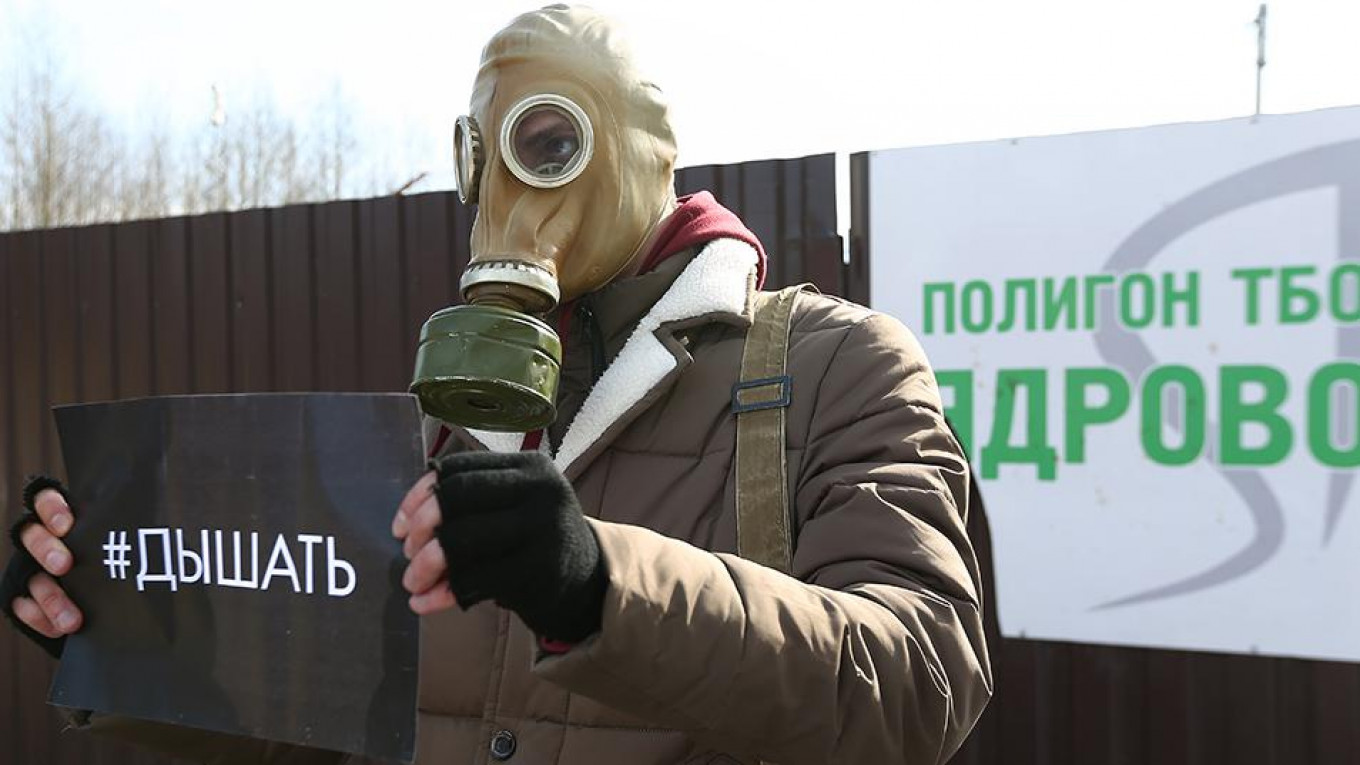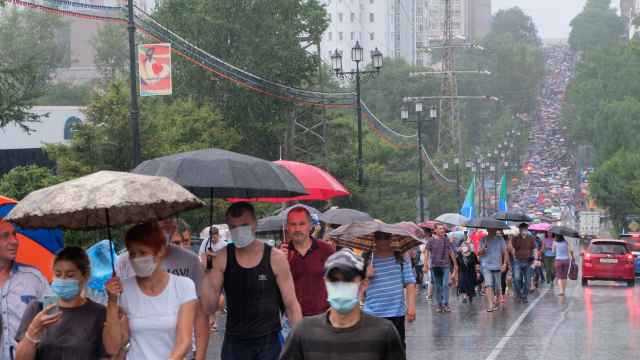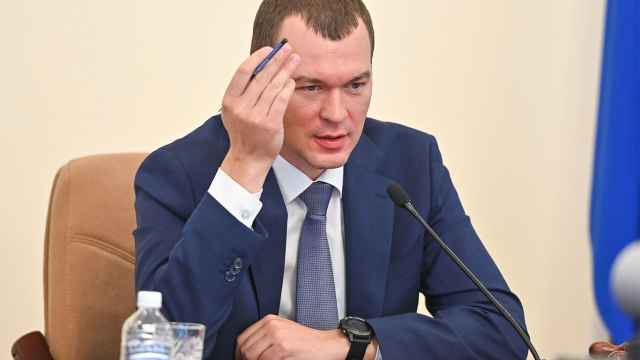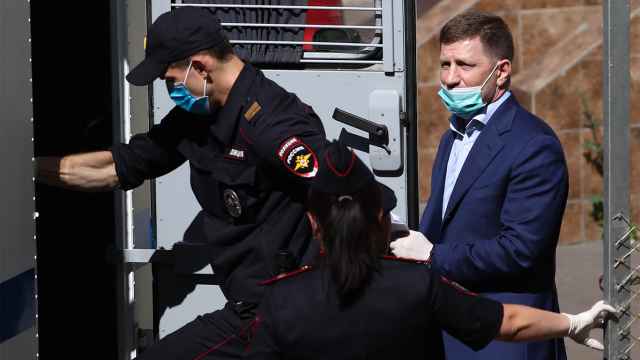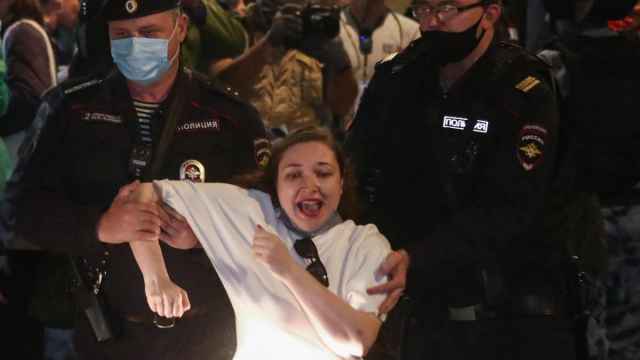Sergei Zhukov woke up with a start last Wednesday. First he heard his daughter’s loud coughing, then he registered the smell. He rushed his eight-year-old to the hospital. “I immediately knew what it was,” the sales manager and activist recounted.
Throughout Volokolamsk, a small town 100 kilometers outside Moscow, dozens of other families were rocked by the same emergency. Over the course of the day, more than one hundred children sought treatment. They all cited that same noxious gas that residents said left them feeling dizzy, nauseous and, in some cases, covered in rashes.
Residents have been protesting the nearby Yadrovo landfill, the source of the potent gases, for more than a year, demanding that it be shut down. After children were acutely affected last week, their frustration boiled over and protests exploded into violence directed at regional officials.
“The government used to ask us to tighten our belts,” said Sergei Gayvoronsky, 65, next to the landfill. “Now they have our belts around our necks. They are choking us.”
According to local activists, the town’s problems began two years ago and have grown as the Yadrovo dump is increasingly overburdened with waste. It now regularly leaks gases that, according to local officials, resulted in abnormal levels of nitric oxide and hydrogen sulfide earlier this month.
Many point to the June 2017 closure of the Kuchino landfill in Balashikha, another Moscow region town, as the reason the Yadrovo landfill has become so overburdened.
“We do not have exact figures of how much waste has started coming to us since,” Zhukov said. “But in a meeting with [the Moscow region’s environment minister] Alexander Kogan in early March, he told us that he estimated Yadrovo took in 500,000 tons of garbage last year, compared to its 200,000 ton capacity.”
The Kuchino dump was closed on the orders of President Vladimir Putin after nearby residents called into his Direct Line, an annual nationally televised Q&A, to complain.
But Putin’s decision has only worsened the situation according to Dmitry Artamonov, the head of Greenpeace’s Zero Waste project in Russia. “If they close a landfill somewhere, that means that the garbage will be transferred elsewhere,” he told The Moscow Times. “So this, of course, is not a solution to the problem.”
The region’s landfills, which also accommodate the capital’s waste, are becoming increasingly strained.
Since 2013, 24 of the region’s 39 landfills have been shut down. According to Sergei Polyakov, a political analyst specializing in the Moscow region, landfills are a lucrative business and interested parties have been fighting to monopolize the industry. It is also why, he said, authorities have been ignoring residents’ demands for modernized waste processing systems.
“There are now only 15 landfills left to accommodate the 12 million tons that the 25 million people of Moscow and the Moscow region produce each year,” explained Nikolai Dizhur, a municipal council deputy of the Moscow region town of Chekhov, who led a hunger strike against the landfill in his town last year.
Other towns in the Moscow region have suffered, too. In addition to Volokolamsk, this month saw protests in Naro-Fominsk, Klin, Balashikha, Troitsk, Kolomna and Sergiyev Posad over landfills.
But for Polyakov, the protests speak to a deeper issue: local governance. He points to 2015, when Moscow region governor Andrei Vorobyov triggered a series of reforms that incorporated towns into larger districts governed by his appointees.
“They don’t listen to the interests of the people because those are not the people that will keep them in office,” said Polyakov. “Instead, they listen to the governor.”
On Friday morning, mayor Pyotr Lazаrev was in front of the town’s administration building speaking with activists and journalists about what steps to take next to get the landfill shuttered. Lazarev is from Volokolamsk, was voted into office in 2016 by the town’s residents and has spent the past year working with activists to close the dump.
“All we can do is raise attention around our issues because, in the end, it’s the governor’s decision,” Lazarev explained from the building’s steps. “But at least now the higher-ups have started to pay attention. Before, they just waved away our problems.”
On Friday, a Moscow region Duma deputy visiting Volokolamsk assured The Moscow Times that the problem would be sorted in “four to five months.”
“My main plea to the people now is for them to give us time,” Vladimir Vshivtsev said. “If we have watched on as the problems have deteriorated for the past decade, now work is happening. Political commotion is not necessary.”
“We need to wait and see why all these people have gotten sick. Let’s wait for the results of the investigations.”
But residents who are falling ill or seeing family members hospitalized say that they do not have time and that political commotion is their only solution.
“We can’t stop protesting until the landfill is shut down,” said Alexander Lvov, 25, whose four-year-old son and wife have been sick repeatedly this month with nausea, headaches and rashes. “If the noxious discharges have so far seen so many people having to visit the hospital, how long until the first death? It’s a ticking time bomb.”
At the town’s main hospital, doctors hurried to and fro to accommodate the dozens of parents and children waiting for consultations.
“She has been dizzy and nauseous since Wednesday,” said Tatiana Papаnova of her fifteen-year-old daughter who was waiting to be seen. “The government is poisoning our children.” Outside, Maya Asenko, whose two sons had just finished their own consultation, said the regional officials responsible “need to be shot and hanged.”
Perhaps seeing that some change was needed to pacify protesters, later on Friday Vorobyov announced that the municipal district head Yevgeny Gavrilov had been fired and was replaced by another outside appointee who quickly said that he would take a strong stance against the landfill.
But on Friday night, Zhukov brushed off the change as more of the same.
“He’s not from Volokolamsk. He’s just another appointed person who is already ignoring what we’ve demanded,” said Zhukov. “What we have been saying, over and over, is that we want this landfill shut down and we want modern waste processing implemented in its place.”
He added: “We need a person who is one of us, who will talk to us, and who will listen.”
Maria Tsnompilantze contributed reporting
A Message from The Moscow Times:
Dear readers,
We are facing unprecedented challenges. Russia's Prosecutor General's Office has designated The Moscow Times as an "undesirable" organization, criminalizing our work and putting our staff at risk of prosecution. This follows our earlier unjust labeling as a "foreign agent."
These actions are direct attempts to silence independent journalism in Russia. The authorities claim our work "discredits the decisions of the Russian leadership." We see things differently: we strive to provide accurate, unbiased reporting on Russia.
We, the journalists of The Moscow Times, refuse to be silenced. But to continue our work, we need your help.
Your support, no matter how small, makes a world of difference. If you can, please support us monthly starting from just $2. It's quick to set up, and every contribution makes a significant impact.
By supporting The Moscow Times, you're defending open, independent journalism in the face of repression. Thank you for standing with us.
Remind me later.


